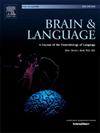Temporary ambiguity and memory for the context of spoken language in adults with moderate-severe traumatic brain injury
IF 2.3
2区 心理学
Q1 AUDIOLOGY & SPEECH-LANGUAGE PATHOLOGY
引用次数: 0
Abstract
Language is processed incrementally, with addressees considering multiple candidate interpretations as speech unfolds, supporting the retention of these candidate interpretations in memory. For example, after interpreting the utterance, “Click on the striped bag”, listeners exhibit better memory for non-mentioned items in the context that were temporarily consistent with what was said (e.g., dotted bag), vs. not consistent (e.g., dotted tie), reflecting the encoding of linguistic context in memory. Here, we examine the impact of moderate-severe traumatic brain injury (TBI) on memory for the contexts of language use. Participants with moderate-severe TBI (N=71) and non-injured comparison participants (NC, N=85) interpreted temporarily ambiguous utterances in rich contexts. A subsequent memory test demonstrated that participants with TBI exhibited impaired memory for context items and an attenuated memory advantage for mentioned items compared to NC participants. Nonetheless, participants with TBI showed similar, although attenuated, patterns in memory for temporarily-activated items as NC participants.
中重度脑外伤成人口语语境的暂时模糊性和记忆力
语言是渐进式处理的,随着语音的展开,听众会考虑多种候选解释,从而支持在记忆中保留这些候选解释。例如,在解释 "点击条纹包 "这句话后,听者会对上下文中暂时与所说内容一致的未提及项目(如点状包)与不一致的项目(如点状领带)表现出更好的记忆,这反映了记忆中的语言上下文编码。在此,我们研究了中度严重创伤性脑损伤(TBI)对语言使用语境记忆的影响。患有中度严重创伤性脑损伤的参与者(71 人)和未受伤的对比参与者(NC,85 人)在丰富的语境中解释了暂时含糊不清的语句。随后的记忆测试表明,与 NC 参与者相比,患有创伤性脑损伤的参与者对语境项目的记忆受损,对提及项目的记忆优势减弱。尽管如此,患有创伤性脑损伤的受试者对临时激活项目的记忆模式与NC受试者相似,尽管有所减弱。
本文章由计算机程序翻译,如有差异,请以英文原文为准。
求助全文
约1分钟内获得全文
求助全文
来源期刊

Brain and Language
医学-神经科学
CiteScore
4.50
自引率
8.00%
发文量
82
审稿时长
20.5 weeks
期刊介绍:
An interdisciplinary journal, Brain and Language publishes articles that elucidate the complex relationships among language, brain, and behavior. The journal covers the large variety of modern techniques in cognitive neuroscience, including functional and structural brain imaging, electrophysiology, cellular and molecular neurobiology, genetics, lesion-based approaches, and computational modeling. All articles must relate to human language and be relevant to the understanding of its neurobiological and neurocognitive bases. Published articles in the journal are expected to have significant theoretical novelty and/or practical implications, and use perspectives and methods from psychology, linguistics, and neuroscience along with brain data and brain measures.
 求助内容:
求助内容: 应助结果提醒方式:
应助结果提醒方式:


